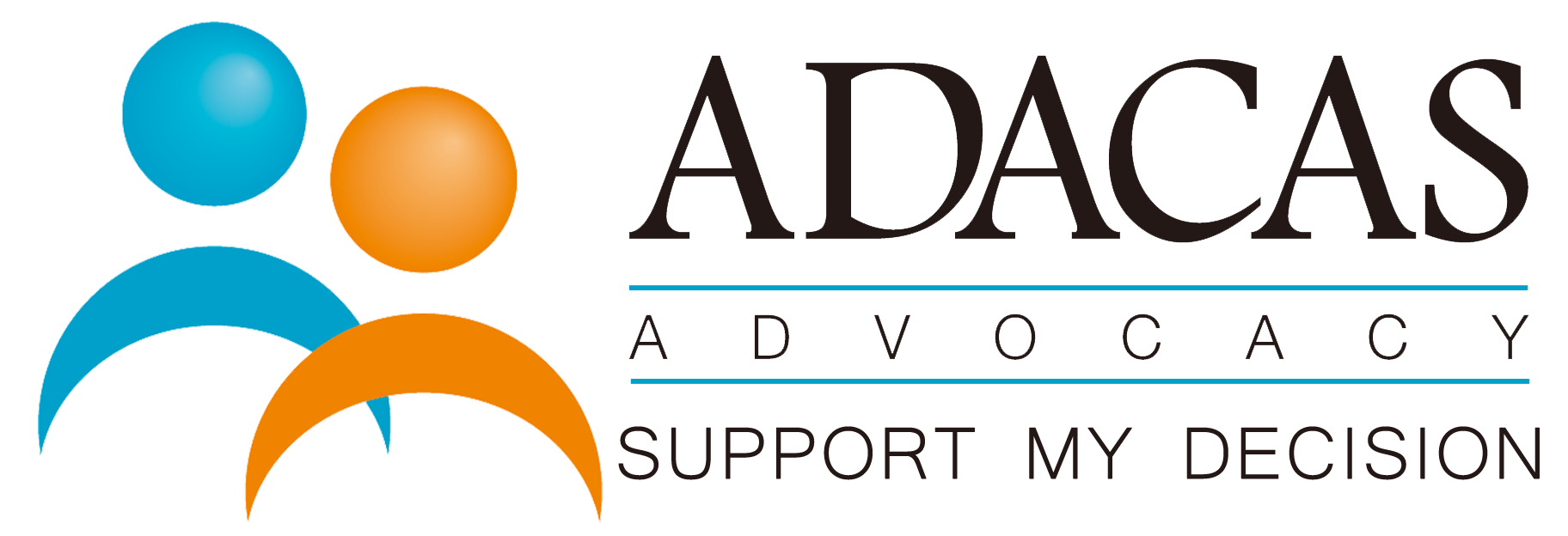About Supported Decision Making

Everyone has the right to make decisions that affect their lives. Supported decision making happens when one person gives another person the support they need to participate in decision making. Support needs are different for everyone and for every decision.
Everyone uses support to make decisions. Sometimes we might need extra support.
This might be:
- When we are unwell
- When others make assumptions about our abilities
Supported decision making involves supporting someone through the decision making process. Different people will need different amounts of support for each part of the decision making process. Some people will need a lot of support and some people will only need a little support.
This website has information and questions that may help you make decisions and support decisions.
If you have any questions or would like more information about supported decision making please contact us.
About our team and our projects
About ADACAS and Supported Decision Making
ADACAS provides free advocacy and information to people in Canberra living with disability, experiencing mental ill-health, older persons and their carers. We are an independent human rights organisation. We believe that all people have an equal right to enjoy their human rights.
ADACAS uses a Supported Decision Making approach to help you to make decisions about the things that are important to you.
When we support you to make a decision, we work with you to understand the decision to be made, and the degree of support you need. We will then support you through the decision making process and build your decision making capacity for the future.
Some of the projects we have worked on
Supported Decision Making in Young People
The Growing Decision Makers Project aimed to improve the skills of a group of young people aged 15-17 years with disability to be more confident decision-makers, and who could identify which people around them were best placed to support them with each unique decision the young person made.
Supported Decision Making in Healthcare
The Supported Decision Making in Healthcare Project focused on the use of supported decision making in a variety of health care settings within Canberra. The project engaged both patients and clinicians in order to build capacity for greater inclusion of people with disability, mental ill-health and older persons within health care settings. We improved skills to embed supported decision making in the day-to-day practices of healthcare staff. The project resulted in increased inclusive decision making being undertaken within healthcare settings, consequently improving patient choice and control.
Working with Older People Experiencing Abuse
ADACAS has worked as part of the Older Person’s Advocacy Network (OPAN) to research how supported decision making and individual advocacy can be used together to support people at risk of or experiencing elder abuse. This project also involved developing training material around this issue for advocacy organizations around Australia so we can all come together to stop older person abuse.
Joint Project between ADACAS and Advocacy for Inclusion
ADACAS partnered with Advocacy for Inclusion (AFI) in a joint project to raise awareness about supported decision making at an individual and systemic level.
Respect Know Act
Our Respect, Know, Act (RKA) project increased support in decision making for people who need to access the ACT’s mainstream health services. This includes people with intellectual impairment, dementia, acquired brain injury or those experiencing mental ill health. Individuals, carers, health professionals and health services worked together with ADACAS to identify barriers to access, and used Supported Decision Making as a tool to enable equitable access.

About ADACAS


ADACAS is an independent, not-for-profit, advocacy organization helping people with disabilities, people with mental health conditions, older people and their carers.
Our mission is to assert, promote and protect the rights and responsibilities of people with disabilities, people with a mental illness, people who are older and people who are caregivers.
ADACAS Services
Advocacy
Advocacy is about helping a person to be heard in the decisions that affect their life. Advocacy aims to increase a person’s control over their lives and support them to develop a sense of empowerment and of being valued as an individual. Advocacy focuses on the needs, wishes, and rights, including the protection of confidentiality of the individual.
Support Coordination
The National Disability Insurance Agency (NDIA) defines support coordination as: ‘Assistance to strengthen participants’ abilities to coordinate and implement supports and participate more fully in the community’. ADACAS is providing a special model of support coordination using advocacy approaches. This means we will use advocacy skills, strategies, and principles to support you to make decisions about how your plan is implemented and empower you to have control of your NDIS services.




